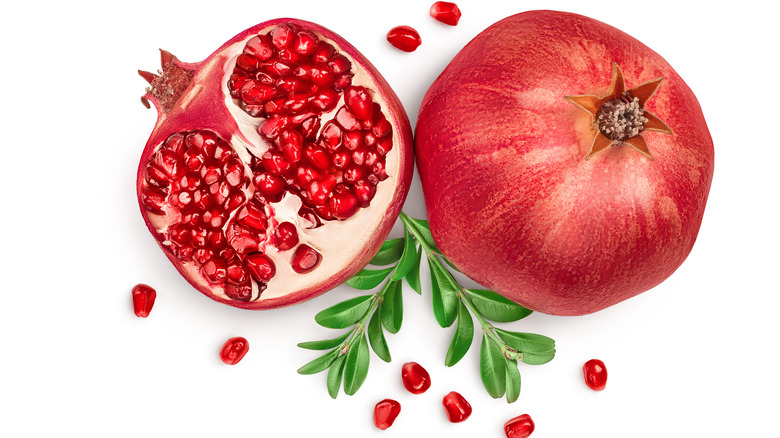Why You Should Be Eating More Pomegranates
The seeds of the pomegranate have been eaten for over 5,000 years, making pomegranates one of the oldest fruits to have been cultivated by humans, according to Alimentarium. Bright, tart, and bursting with color, these seeds are still popular in a wide variety of cuisines, both as a dessert and in main courses. But the flavor is just one thing to like about this refreshing fruit — there is also quite the nutritional punch packed into each tiny seed.
Pomegranates are a member of the berry family, and are nutritionally similar to other antioxidant-rich foods like blueberries, raspberries, and goji berries. They contain high amounts of antioxidants, including a powerful compound called polyphenols, which is what gives the seeds their bright red color, according to Medical News Today. But this healthy antioxidant doesn't just make the fruit a pleasing color — it has also been shown to help lower the risk of certain diseases by reducing inflammation and protecting against cell damage.
Regularly eating pomegranates can help reduce the risk of a number of illnesses
Pomegranates also contain another health-boosting element called punicic acid, which is a fatty acid that may help protect against breast cancer and help reduce inflammation in the blood and gut, according to BBC Good Food. Some studies have also shown punicic acid may help lower triglycerides and LDL cholesterol levels, therefore decreasing the risk of high blood pressure and heart disease, as Healthline reported.
But that's not all the powerful fruit can do. It also contains flavonols that can help reduce the risk of osteoporosis and protect against arthritis, per Medical News Today. Further studies have even shown that pomegranates can help improve brain health. Some research has shown that eating pomegranates can help improve memory, while another study conducted on mice suggests that pomegranates may help prevent the development of Alzheimer's disease, according to Healthline. Pomegranates also have antibacterial and anti-fungal properties. Because they are rich in vitamins C and E, pomegranates can help the body fight off infections, and can even help protect against harmful mouth issues like gingivitis and periodontitis.
Eating more pomegranates will benefit your health in more ways than one. Adding this fruit to your diet can help improve everything from your heart health to your cognitive function — and their refreshingly sweet flavor is just another pleasant added bonus.

